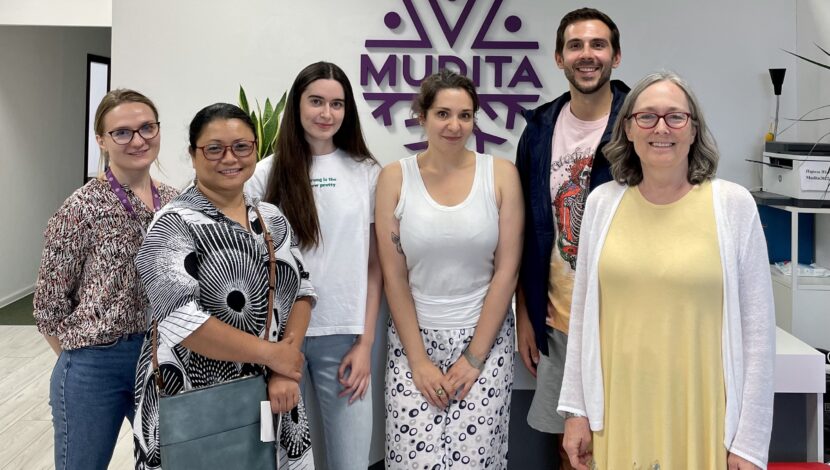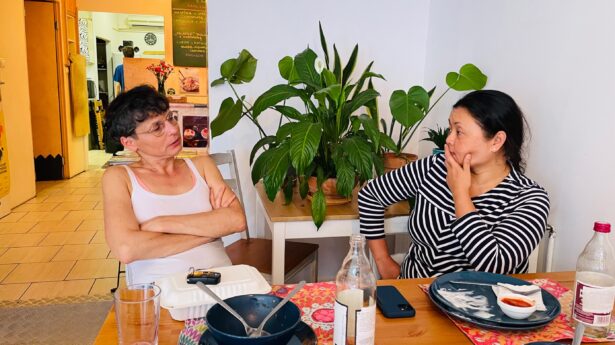The Unitarian Universalist Service Committee advances human rights through grassroots collaborations.
Visiting Eastern Europe’s Grassroots Frontline Responders: Listening to Impacted Communities (Part 1)

By Rev. Mary Katherine Morn on September 6, 2023
Russia’s full-scale invasion of Ukraine in February 2022 has taken the lives of and displaced thousands. As the war between the two nations continues, UUSC has a steadfast commitment to not only providing first response aid to those who have been displaced and other survivors, but also to addressing the medium- and long-term ramifications of this conflict. UUSC staff traveled to Poland—where many have fled Ukraine in the wake of the invasion—for an informative update on the situation on the ground involving its partners and to learn what issues are still impacting the people of Ukraine and what we can be doing to advance justice and equity in the region in the long term.
Visiting Eastern Europe to strengthen relationships with UUSC’s partners in the area was eye-opening and humbling. As with all of our grassroots partners, we strive to approach these relationships with humility and curiosity—and listening is fundamental to embodying these values.
I accompanied colleagues—Michael Kourabas (Director of Partner Support and Grantmaking) and Myra Dahgaypaw (Senior Partnership Officer for International Justice and Accountability)— on this journey to learn more about the lived experiences of our Eastern European partners. We learned a wealth of vital information that informs the work that we do and inspires us to continue showing up for the communities that are experiencing oppression in the region.
UUSC currently has 10 partners in Eastern Europe—located in England, Poland, Ukraine—who do a range of life-saving activities, from direct support to advocacy. Our partners include:
From addressing the dire consequences of activist burnout to supporting the rights of BIPOC Ukrainians; affirming the worth and dignity of the Roma people to advocating on behalf of LGBTQ+ community members, these organizations play a pivotal role in helping those who are displaced and impacted by Russia’s 2022 invasion.
The conversations we had were rich and we made a number of critical observations, including:
Refugees Still Need Our Support
The thousands of refugees who have fled Ukraine continue to face complex and disheartening challenges.
With the national elections in Poland just weeks away, we can expect right-wing propaganda dehumanizing refugees and disparaging their presence in Poland. Policies could be passed criminalizing the provision of aid to these refugees and we will undoubtedly see an uptick in violence as conservative politicians and commentators demonize Ukrainian refugees as being criminals and/or a drain on Polish resources.
This is further compounded when viewed through the lens of refugees with multiple oppressed identities. For example, members of the LGBTQ+ community, refugees of color, people with disabilities, women, the Roma community, and other groups will face increased scrutiny and marginalization.
Our partner, Queer Svit, shared the tale of a Black trans woman who is fighting for a humanitarian visa. Another partner, Towards Dialogue, told us of the complexity in dismantling the narrative that the Roma people—Europe’s largest ethnic minority, encompassing many different sub-groups, including Kalderash in south-eastern Europe; Romanichals in England; Sinti in Germany, Italy, and France; Kalé in Wales, Finland, Spain and Portugal; and Gitano from Spain, as well as many travelers—are “nomads” and not in need of a permanent place to live or resources for long-term support. Roma communities that are from Poland also encounter barriers to opportunity and basic needs.
As refugees, those fleeing the war face layers of suspicion and discrimination.
“Not all refugees are treated equally,” said Joanna, a staff member with Towards Dialogue.
Women and Girls Face Unique Obstacles
Women and girls fleeing the war also face additional risks when in forced migration. A significant concern is the provision of reproductive health services. Doctors have the right to decline to perform abortions based on religious reasons and Poland is one of the most restrictive nations with regard to reproductive rights.
Sex trafficking was a fear at the beginning of the 2022 invasion, but has devolved into a very-real threat as we see more women and girls facing forced disappearances and sexual exploitation. Women and girls already traumatized by the war must now contend with the possibility of being kidnapped and sold.
Funding is Fleeing
More and more funders are withdrawing their resources for refugee support as the war continues. Moving on to other “trendier” funding areas, many funders lack a long-term analysis around the needs of people on the ground. So, they take their resources elsewhere and the organizations on the ground are forced to scramble for funds to continue doing the work.
Most grants are restricted and short term, and as these organizations grow, they find themselves in need of further funding, which they are increasingly being denied access to. Every single partner we met with stressed the importance of long-term, flexible funding to nourish their organization and continue their life-saving work.
As we know very well, funding for long-term work is limited, while funding for immediate crises is much more plentiful. But how do these organizations cope when the crisis moves beyond a short-term problem to a long-term condition, as they always do? Funding for first response work is critical, but not enough.
Signs of Hope
These are just three of many examples of the types of difficult conditions these communities face in the wake of a violent invasion and deadly war. However, there are reasons to be hopeful.
Many of the people who have been served by these organizations have decided to commit themselves to joining the larger movement—not just as recipients of service, but frontline advocates, organizers, and activists with the lived experience to inform their work.
Our partners see clearly the intersections of oppression. A partner that focuses on the Roma community may develop an understanding of how LGBTQ+ Roma are in need of culturally competent healthcare or the increasing needs of Roma with disabilities. The more comprehensive understanding of the unique needs of the communities they serve, the more services these organizations seek to offer—and the more they collaborate with each other.
Critically important is the impact that emerges from changing the prevailing narrative. While advocacy on a national level has been unproductive, there have been victories on a local level that have come from humanizing the struggles of those who have been displaced. In the long term, as we tell the stories of the Roma, people with disabilities, members of the LGBTQ+ community, women, and BIPOC people, we move a humanitarian narrative forward that subverts harmful and violent narratives. There is immense hope in the stories that highlight the dignity, worth, and power within each of us and within our communities.
UUSC is wholly committed to continuing this work in the long term. Investing our resources in these organizations and the communities they serve is pivotal to ensuring their survival. We are fortunate to have a long-term lens that allows us to invest in these partnerships in ways that acknowledge and affirm the seriousness of these issues over an extended period of time.
As you continue reading through this series, please keep in mind that your donation to our Emergency Response Fund provides resources not just to these 10 organizations, but to the narrative change they seek to make the world more equitable for all.
Image Credit: UUSC

